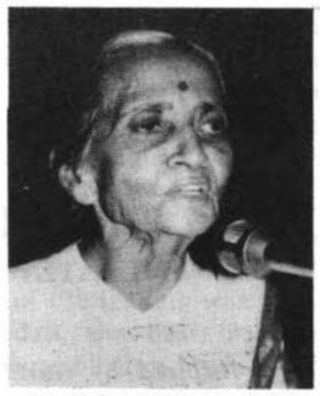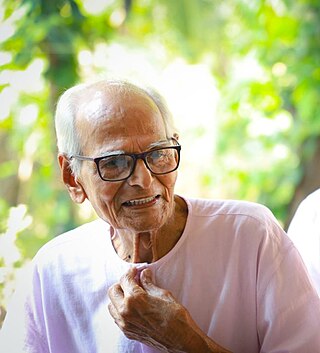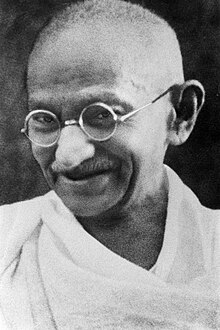
Anil Kakodkar, is an Indian nuclear physicist and mechanical engineer. He was the chairman of the Atomic Energy Commission of India and the Secretary to the Government of India, he was the Director of the Bhabha Atomic Research Centre, Trombay from 1996 to 2000. He was awarded the Padma Vibhushan, India's second highest civilian honour, on 26 January 2009.

Bibhutibhushan Bandyopadhyay was an Indian writer in the Bengali language. His best known works are the autobiographical novel Pather Panchali, Aparajito (Undefeated), Chander Pahar and Aranyak.

Usha Mehta was a Gandhian and independence activist of India. She is also remembered for organizing the Congress Radio, also called the Secret Congress Radio, an underground radio station, which functioned for few months during the Quit India Movement of 1942. In 1998, the Government of India conferred on her Padma Vibhushan, the second highest civilian award of the Republic of India.

Tarasankar Bandyopadhyay was an Indian novelist who wrote in the Bengali language. He wrote 65 novels, 53-story-books, 12 plays, 4 essay-books, 4 autobiographies, 2 travel stories and composed several songs. He was awarded Rabindra Puraskar, Sahitya Akademi Award, Jnanpith Award, Padma Shri and Padma Bhushan. He was nominated for Nobel Prize in Literature in 1971 and posthumously nominated in 1972.

Boalkhali is an upazila of Chattogram District in Chattogram Division, Bangladesh.

Chandi Prasad Bhatt is an Indian environmentalist and social activist, who founded Dasholi Gram Swarajya Sangh (DGSS) in Gopeshwar in 1964, which later became a mother-organization to the Chipko Movement, in which he was one of the pioneers. For his work Bhatt was awarded the Ramon Magsaysay Award in 1982, followed by the Padma Bhushan in 2005.
G. Ramachandhran was a soldier for the Gandhian cause, social reformer and a teacher. With his wife, Dr. T. S. Soundram, daughter of T V Sundaram Iyengar, founder of TVS Group, he started the Gandhigram, Tamil Nadu in 1945. He authored several books. Viswabharati, Rabindranath Tagore's University, in Santhiniketan awarded him the higher title "Desikottama".

Ichamati River, is a trans-boundary river which flows through India and Bangladesh and also forms part of the boundary between the two countries. The river is facing siltation leading to thin flow of water in the dry season and floods in the rainy season. Experts are considering remedial measures and the situation is being discussed between the governments of India and Bangladesh.

Dattatreya Balkrishna Kalelkar, popularly known as Kaka Kalelkar, was an Indian independence activist, social reformer, journalist and an eminent follower of the philosophy and methods of Mahatma Gandhi.

Ravindra Kumar is a Political Scientist, Peace Educator, an Indologist, a Humanist, Cultural Anthropologist and a former Vice-Chancellor of CCS University, Meerut (India).
Jharna Dhara Chowdhury was a Bangladeshi social activist.

The history of the textile arts of Bangladesh dates back to the 1st century AD. According to the archaeological excavations, Bangladesh was once famous for its artistic textile production throughout the world. Over the years, several types of textiles evolved in the country, mostly by the indigenous handloom manufacturers.

Shobhana Ranade is an Indian social worker and Gandhian, known for her services towards her cause of destitute women and children. The Government of India honoured her in 2011, with the Padma Bhushan—the third highest civilian award—for her services to the society.

Rabindra Nath Upadhyay (1923–2010) was an Indian social worker, Gandhian and the founder of Tamulpur Anchalik Gramdan Sangha (TAGS), a non governmental organization working for the social development of the rural people in the Kumarikata village of Assam. He was a recipient of the 2003 Jamnalal Bajaj Award. The Government of India awarded him the fourth highest civilian award of the Padma Shri, in 2000, for his services to the society.

Omeo Kumar Das, popularly addressed as Lok Nayak, was an Indian social worker, Gandhian, educationist, writer and a former minister at the Government of Assam. He held various ministerial portfolios such as Education, Labour and Food and Civil Supplies, during various periods, in the state of Assam. He translated The Story of My Experiments with Truth, the autobiography of Mahatma Gandhi, into Assamese language and contributed to the implementation of Tea Plantation Worker’s Provident Fund in the state. The Government of India awarded him the third highest civilian honour of the Padma Bhushan, in 1963, for his contributions to society. India Post honoured Das by issuing a commemorative stamp on him on 15 May 1998.
Pushpalata Das (1915–2003) was an Indian independence activist, social worker, Gandhian and legislator from the north-east Indian state of Assam. She was a member of Rajya Sabha from 1951 to 1961, a member of the Assam Legislative Assembly and a member of the working committee of the Indian National Congress. She served as the chairperson of the Assam chapters of the Kasturba Gandhi National Memorial Trust and Khadi and Village Industries Commission. The Government of India awarded her the third highest civilian honour of the Padma Bhushan, in 1999, for her contributions to society.
Balasaheb Shivram Bharde (1912–2006), also known as Trimbak, was an Indian independence activist, social worker, educationist and the speaker of Maharashtra Legislative Assembly. He was known for his contributions to the cooperative movement in Maharashtra as the Minister of Co-operation (1957–1962). He was associated with several social and government organizations such as Khadi Gramodhyog, Harijan Sevak Sangh and Maharashtra Gandhi Smarak Nidhi (MGSN) and served as the chairman of the first named and as the second president of the MGS Nidhi. He also chaired the Maharashtra State Khadi Board.
Padmanabha Pillai Gopinathan Nair was an Indian social worker, Gandhian, independence activist, and the chairman of Mahatma Gandhi National Memorial Trust. He participated in the Quit India movement of 1942 and worked alongside Vinoba Bhave to promote Bhoodan and Gramdan movements. He was the initiator of the camp movement, a student program that was part of the Construction Movement of Mahatma Gandhi. He was a recipient of the Jamnalal Bajaj Award, among other honors. The Government of India awarded him the fourth highest civilian honour of the Padma Shri, in 2016, for his contributions to society.

V. P. Appukutta Poduval is an Indian independence activist and Gandhian social activist from Kerala, India. He was awarded Padma Shri by the Government of India in 2023.
The Gandhi Peace Foundation is an Indian organisation that studies and develops Mahatma Gandhi's thought.














